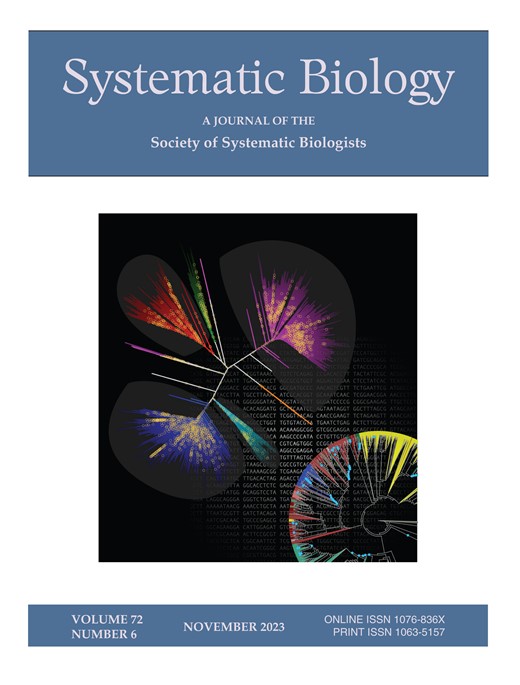Inference of Cross-Species Gene Flow Using Genomic Data Depends on the Methods: Case Study of Gene Flow in Drosophila.
IF 5.7
1区 生物学
Q1 EVOLUTIONARY BIOLOGY
引用次数: 0
Abstract
Analysis of genomic data in the past two decades has highlighted the prevalence of introgression as an important evolutionary force in both plants and animals. The genus Drosophila has received much attention recently, with an analysis of genomic sequence data revealing widespread introgression across the species phylogeny for the genus. However, the methods used in the study are based on data summaries for species triplets and are unable to infer gene flow between sister lineages or to identify the direction of gene flow. Hence, we reanalyze a subset of the data using the Bayesian program bpp, which is a full-likelihood implementation of the multispecies coalescent model and can provide more powerful inference of gene flow between species, including its direction, timing, and strength. While our analysis supports the presence of gene flow in the species group, the results differ from the previous study: we infer gene flow between sister lineages undetected previously whereas most gene-flow events inferred in the previous study are rejected in our tests. To verify our conclusions, we performed simulations to examine the properties of Bayesian and summary methods. Bpp was found to have high power to detect gene flow, high accuracy in estimated rates of gene flow, and robustness under misspecification of the mode of gene flow. In contrast, summary methods had low power and produced biased estimates of introgression probability. Our results highlight an urgent need for improving the statistical properties of summary methods and the computational efficiency of likelihood methods for inferring gene flow using genomic sequence data.利用基因组数据推断跨物种基因流依赖于方法——以果蝇基因流为例。
对过去二十年基因组数据的分析突出表明,基因渗入是植物和动物中普遍存在的重要进化力量。果蝇属最近受到了广泛的关注,对基因组序列数据的分析揭示了该属在物种系统发育中的广泛渗入。然而,研究中使用的方法是基于物种三胞胎的数据摘要,无法推断姐妹谱系之间的基因流动或确定基因流动的方向。因此,我们使用贝叶斯程序bpp重新分析数据子集,该程序是多物种凝聚模型的全似然实现,可以提供更强大的物种间基因流动推断,包括其方向,时间和强度。虽然我们的分析支持物种组中基因流动的存在,但结果与之前的研究不同:我们推断了以前未检测到的姐妹谱系之间的基因流动,而在之前的研究中推断的大多数基因流动事件在我们的测试中被拒绝。为了验证我们的结论,我们进行了模拟来检查贝叶斯和总结方法的特性。Bpp检测基因流的能力强,估计基因流率的准确性高,在基因流模式错误的情况下具有鲁棒性。相比之下,摘要方法的功效较低,而且对渗入概率的估计有偏倚。我们的结果强调了迫切需要改进汇总方法的统计特性和利用基因组序列数据推断基因流的似然方法的计算效率。
本文章由计算机程序翻译,如有差异,请以英文原文为准。
求助全文
约1分钟内获得全文
求助全文
来源期刊

Systematic Biology
生物-进化生物学
CiteScore
13.00
自引率
7.70%
发文量
70
审稿时长
6-12 weeks
期刊介绍:
Systematic Biology is the bimonthly journal of the Society of Systematic Biologists. Papers for the journal are original contributions to the theory, principles, and methods of systematics as well as phylogeny, evolution, morphology, biogeography, paleontology, genetics, and the classification of all living things. A Points of View section offers a forum for discussion, while book reviews and announcements of general interest are also featured.
 求助内容:
求助内容: 应助结果提醒方式:
应助结果提醒方式:


